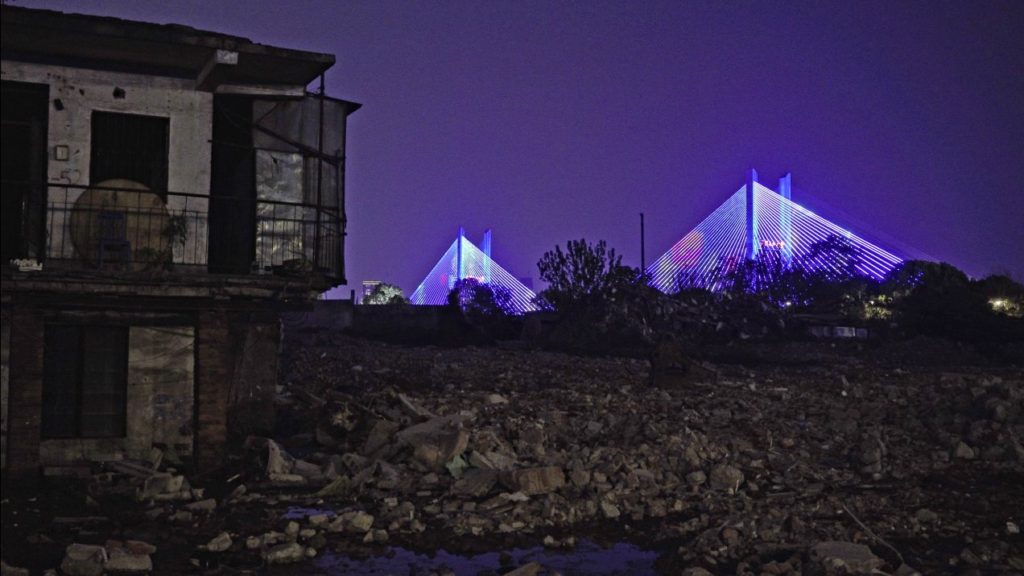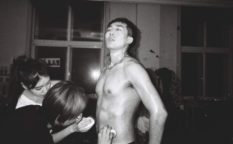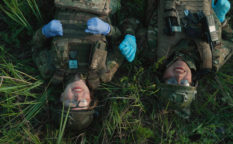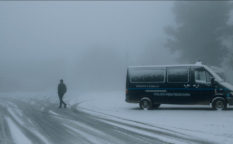Review: A River Runs, Turns, Erases, Replaces (2021)

Some toponyms are destined to be carved in our collective memory forever, for one reason or another. The city of Wuhan bears a double significance. Before 2020, it served as a showcase of Chinese industrial and economic growth, reflecting on the change in lifestyle and visible urban development projects. Since 2020 and the Covid-19 pandemic, it is recorded as the place where it all started and as the first place to be put under a very strict lockdown.
A River Runs, Turns, Erases, Replaces is a documentary directed by the Wuhan-born US-based filmmaker Zhu Shengze, previously known for her films Present. Perfect. (2019) and Another Year (2016). The topic of the film is the city of Wuhan itself, its past, present and the vision of the future, with Yangtze river running through as the focal point of the film, carrying its spiritual philosophy. Zhu’s documentary had an impressive tour of festivals last year, starting with Berlinale (where it was screened in Forum section and won the Caligari Award), continuing with Cinéma du Réel, Hot Docs, Dokufest, Beldocs, Viennale, IDFA and finally Human Rights Film Festival in Zagreb, Croatia.
At first, there is no river. Heck, there is no sound either. All we get to see is a surveillance-type of camera footage, observing one of the downtown streets. The time is mid-March and the emptiness of the street is interrupted just by the delivery persons running their motorbikes, communal workers cleaning the pavement and rare passers-by in the succession of shots divided by jump cuts. Suddenly, it is April 4th, the lockdown is lifted to the sound of sirens wailing and car horns blaring, after which the life goes back to “new normal”: people wearing masks and gathering in small groups, some of them taking photos to capture the moment.
One could assume that the rest of the film, starting with the ceremony of turning the city lights on, is the aftermath of lockdown. We see the life going on the way we remember it, work-wise: bridges are being built, neighbourhoods are being torn down or renovated, the ferries are taking cars and bikes from one side of the river to another, and the landscape often gets all grey due to smog, or it melts down in sunrays reflecting from the water. Life goes on also leisure-wise: people engage in occasional ceremonies, spend their free time with families or their pets, as it could be seen in one of the film’s most impressive shots with three dogs of different breeds, ages and sizes playing on the quay.
The idea that the “action” is set in the post-pandemic context is further highlighted by highly emotional letters written by different people to their family members who either died, or were cut off from their dearest due to lockdowns, which serve as the only textual material in this largely wordless observational film essay. The trick is, however, that the footage was obtained from 2016 to 2019 during Zhu’s visits to her hometown.
The imagery consisting of beautifully framed static wide-angle shots in which we almost always see the river that serves as the symbol of the flow and life itself, beautifully welded together by Zhu herself, is strong enough to transcend any particular context and work well in different ones, making A River Runs, Turns, Erases, Replaces a life-celebrating work of cinema that speaks volumes. It might be the ultimate pandemic-provoked documentary, but it is actually so much more than that.
Year: 2021
Runtime: 87’
Countries: China, USA
Language: no dialogue, text in Mandarin
Directed by: Zhu Shengze
Written by: Zhu Shengze
Cinematography by: Zhu Shengze, Yang Zhengfan
Edited by: Zhu Shengze
Sound recording by: Zhu Shengze, Yang Zhengfan
Re-recording mixer: Aymeric Dupas
Music by: Wei Wu and SMZB
Colourist: Vivian
Produced by: Zhu Shengze, Yang Zhengfan
Production company: Burn the Film Production House
















